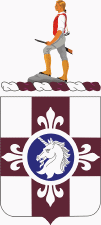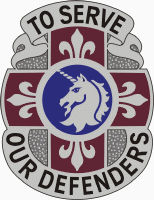429th Medical Battalion, US Army: Difference between revisions
(Created page with "{{us}} ''' {{uc:{{PAGENAME}}}} ''' {|align="center" |align="center"|center|350px|Arms of {{PAGENAME}} <br> (Coat of Arms) |align="center"|File:429...") |
Knorrepoes (talk | contribs) m (Text replacement - "Category: " to "Category:") Tags: Mobile edit Mobile web edit |
||
| (6 intermediate revisions by the same user not shown) | |||
| Line 1: | Line 1: | ||
''' {{uc:{{PAGENAME}}}} ''' | ''' {{uc:{{PAGENAME}}}} ''' | ||
{|align="center" | {|align="center" | ||
|align="center"|[[File:429medbn.gif|center| | |align="center"|[[File:429medbn.gif|center|350 px|Coat of arms (crest) of {{PAGENAME}}]] <br> (Coat of Arms) | ||
|align="center"|[[File:429medbn1.gif|center| | |align="center"|[[File:429medbn1.gif|center|350 px|Coat of arms (crest) of {{PAGENAME}}]] <br> (Distinctive Unit Insignia) | ||
|} | |} | ||
| Line 21: | Line 19: | ||
Maroon and white are traditionally used by the Medical Corps. Blue denotes loyalty and truth. The cross is a symbol of service and physical care; it refers to the organization's mission of medical support. The unicorn, powerful and swift creature of mythology, symbolizes strength, wisdom and virtue. The horn of the unicorn was thought to possess an antidote against poison and was credited with extraordinary healing powers. The four fleurs-de-lis stand for the Battalion's participation in four campaigns in Europe during World War II. | Maroon and white are traditionally used by the Medical Corps. Blue denotes loyalty and truth. The cross is a symbol of service and physical care; it refers to the organization's mission of medical support. The unicorn, powerful and swift creature of mythology, symbolizes strength, wisdom and virtue. The horn of the unicorn was thought to possess an antidote against poison and was credited with extraordinary healing powers. The four fleurs-de-lis stand for the Battalion's participation in four campaigns in Europe during World War II. | ||
The | The arms were approved on 17 April 2001. The Distinctive Unit Insignia was approved on 18 September 1970. | ||
[[Literature]]: The Institute of Heraldry, US Army. | [[Literature]]: The Institute of Heraldry, US Army. | ||
[[Category:Military heraldry of the United States]] | [[Category:Military heraldry of the United States]] | ||
[[Category: Army heraldry]] | [[Category:Army heraldry]] | ||
[[category: Granted 1970]] | [[category: Granted 1970]] | ||
[[Category: Granted 2001]] | [[Category:Granted 2001]] | ||
Revision as of 09:06, 15 October 2023
429TH MEDICAL BATTALION, US ARMY
| (Coat of Arms) |
(Distinctive Unit Insignia) |
Official blazon
Shield: Argent, on a cross Sanguine, a plate radiating four demi-fleurs-de-lis crosswise of the first bearing a hurt charged with a unicorn's head erased of the first. Crest: That for the regiments and separate battalions of the Army Reserve: From a wreath Argent and Sanguine, the Lexington Minute Man Proper. The statue of the Minute Man, Captain John Parker (H.H. Kitson, sculptor), stands on the common in Lexington, Massachusetts. Motto: TO SERVE OUR DEFENDERS.
Distinctive Unit Insignia. Description: A silver color metal and enamel device 1 3/16 inches (3.02cm) in height overall consisting of a Maroon cross surmounted by a Silver disc emitting crosswise four Silver demi-fleurs-de-lis and bearing on a smaller Blue disc a Silver unicorn's head; all between two Silver scrolls, the upper scroll inscribed "TO SERVE" and the lower "OUR DEFENDERS" in blue letters.
Origin/meaning
Maroon and white are traditionally used by the Medical Corps. Blue denotes loyalty and truth. The cross is a symbol of service and physical care; it refers to the organization's mission of medical support. The unicorn, powerful and swift creature of mythology, symbolizes strength, wisdom and virtue. The horn of the unicorn was thought to possess an antidote against poison and was credited with extraordinary healing powers. The four fleurs-de-lis stand for the Battalion's participation in four campaigns in Europe during World War II.
The arms were approved on 17 April 2001. The Distinctive Unit Insignia was approved on 18 September 1970. Literature: The Institute of Heraldry, US Army.

